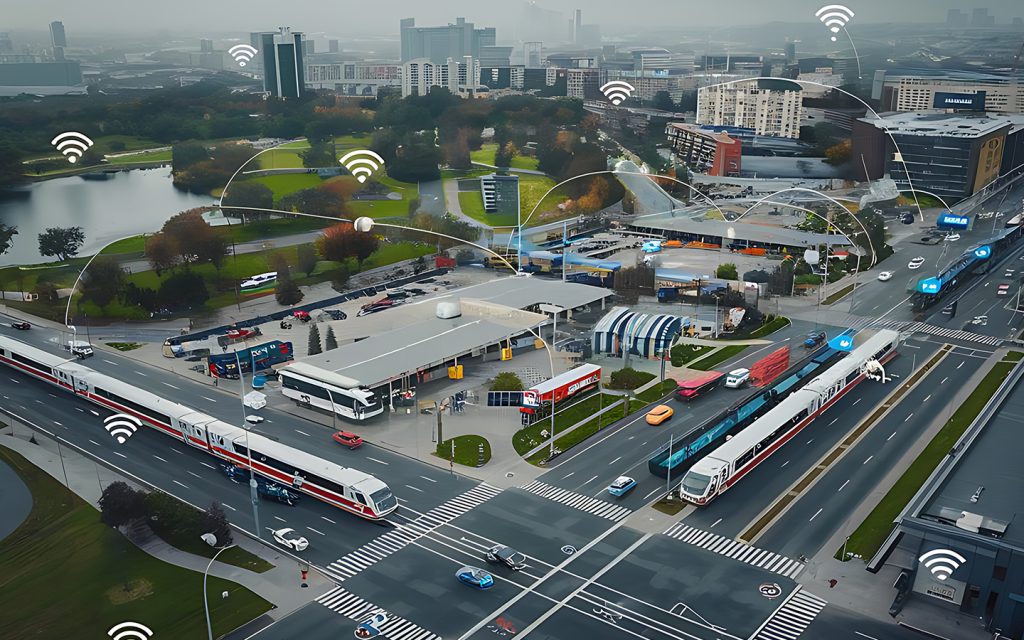Future of Fleet Management: Software Solutions for Businesses

Explore how fleet management software can transform your business. See the features of modern software and how AI and IOT impact fleet management software.
In today’s modern era, managing a business manually is quite difficult, but managing your fleet vehicle is more important than ever. Innovative software solutions transform fleet management, and with the help of this software, you can streamline your operations. In this blog, we explore the impact and change.
The Evolution of Fleet Management
Fleet management Systems have brought very innovative and modern changes over the last few years. Initially, for many years, business owners used manual methods to track their vehicles and make reports by hand, such as reports or fuel usage records. This method was very tough and time-consuming, and sometimes it caused mistakes and trust issues.
The development brings very modern things into our lives. The technical development of the Global Positioning System allows each size of sizes to use software and track their vehicle automatically with the latest software. This change in the tracking system enhanced route optimization and increased customer satisfaction.
In today’s fast-paced world, you can handle many technical things or deal with many technologies on a single fleet management software. This software includes the latest features, such as real-time tracking, monitoring driver behavior, maintenance warnings, and some other key features as wel,l that can help to manage your business fleet more effectively and efficiently.
Key Features of Modern Fleet Management Software
Modern fleet management software has numerous latest features that can streamline your business operations. Explore all the key features in detail :
Real-Time Vehicle Tracking:
This software has a function of real-time vehicle tracking. This feature helps to stay updated with the current location of your vehicle. Managers can monitor their routes and make sure of on-time delivery, respond faster to any difficulty, and prevent any big disasters.
Predictive Maintenance:
This fleet management software analyzes your vehicle data performance and checks when you are required to do maintenance. These features update you about any repairs and issues earlier, and you can save a huge amount of money.
Driver Behavior Monitoring:
Stay up to date with the driver’s behavior and habits, like speed, braking, and idle period. This system promotes safety and reduces the use of fuel consumption.
Fuel management:
Fleet management software has the feature and function to monitor your fuel. It gives you an alert before fuel ends, so businesses can reduce the unexpected risks of stopping vehicles.
Compliance Management:
The software helps to keep track of regulatory requirements, ensuring that all vehicles and drivers follow industry standards and avoid any fines.
The Impact of AI and IoT on Fleet Management
How AI and IoT are transforming fleet management.
AI and the Internet of Things (IoT) are changing fleet management by increasing efficiency, lowering costs, and boosting safety. Let us take a deeper look at how they help.
Predictive Analytics for Better Decisions.
AI analyzes vast amounts of data to predict when a car management system will need maintenance. This makes it possible for fleet managers to resolve issues before they worsen. Additionally, it optimizes routes according to road conditions, weather, and traffic patterns. As a result, the companies can ensure on-time delivery, save money on maintenance, and save money on petrol.
IoT Devices for Real-time Monitoring
Data about engine performance, fuel consumption, and driving habits is continually collected by IoT sensors fitted into vehicles. Fleet managers can utilize this data to track vehicle health, increase fuel efficiency, and enhance overall safety. When a car shows signs of a technical problem, it is best to take immediate action to avoid breakdowns and costly repairs.
Real World Impact
One of the best examples of AI in fleet management is Three Men Movers, a moving company located in the UAE. They monitored driving behavior and enhanced routes by using artificial intelligence. Three months later, they discovered a 4.5% drop in accidents. This illustrates the potential for safer and more effective operations with AI-enabled fleet management.
Cloud-Based Fleet Management: The New Industry Standard
- How Cloud Computing is Transforming Fleet Management
Cloud computing is becoming an increasingly important component of fleet management today because of its many benefits. Businesses can save money and improve accessibility by using it to manage their fleets more efficiently. Let’s examine its benefits:
- Easy Access from Anywhere
Managers who utilize cloud-based fleet management may access fleet data anywhere there is an internet connection. This allows them to track performance, monitor automobiles, and make important decisions when they’re not in the office.
- Grows with Your Business
Because cloud solutions are so scalable, they can quickly adapt to the fleet’s expansion. Whether a business begins with a small fleet or develops into a large one, the system can accommodate the growth without requiring large financial outlays.
- Reduces Operational Costs
Using cloud-based solutions rather than expensive on-site servers and maintenance may save businesses a significant amount of money. Businesses may concentrate on improving fleet management and efficiency rather than worrying about hardware costs.
- Always Up to Date
Because cloud-based software is regularly updated, businesses can always take advantage of the newest security features and capabilities. This maintains the system operating effectively and eliminates the need for manual updates.
The Role of Automation in Fleet Operations
- How Automation Improves Fleet Management
Fleet management is becoming easier and more efficient as a result of automation, which reduces human labor while boosting overall operations. It enables organizations to save time, lower expenses, and make better decisions. Let’s look at how automation improves several areas of fleet management.
- Smarter Scheduling and Dispatching
Manually assigning drivers and cars is time-consuming and prone to mistakes. Automated solutions, on the other hand, make this procedure easier by allocating drivers and cars based on critical parameters, including location, delivery urgency, and traffic conditions. This guarantees that each trip is well planned, resulting in lower fuel use and faster deliveries. As a consequence, organizations can better manage their resources and increase customer satisfaction.
- Accurate and Detailed Reporting
Manually monitoring fleet performance can be difficult and lead to information being missed. Software for automated reporting, which produces comprehensive data on key performance indicators, solves this issue. Fuel consumption, vehicle maintenance schedules, and driving performance are all included in these reports. With this information, fleet managers can make data-driven decisions that save expenses, improve safety, and keep things running smoothly.
- Instant Alerts and Notifications
Unexpected situations such as vehicle breakdowns or compliance deadlines can pose major problems if not addressed promptly. When a serious issue emerges, automated fleet management systems inform managers in real time. Whether it’s a mechanical fault, overdue maintenance, or a compliance obligation, these notifications enable fleet managers to take fast action and avoid costly delays or fines.
Sustainability and Green Fleet Management
- Sustainable Fleet Management: A Step Towards a Greener Future
Businesses are more focused on environmental responsibilities, and the same as fleet management is no different than environmental responsibilities. Organizations can lower their carbon footprint, comply with laws, and save money by implementing sustainable practices. Here are some essential strategies to make fleet operations more environmentally friendly.
- Switching to Electric and Hybrid Vehicles
Electric vehicles and hybrid vehicles in fleet management are some of the most effective methods to increase sustainability. These cars emit fewer greenhouse gases than regular fuel-powered automobiles. Initial expenditure can be costly; that’s why companies can save money in the long term by reducing fuel costs and utilizing government subsidies for environmentally friendly transportation.
Optimizing Routes for Fuel Efficiency
Weak and poor route planning can cause expensive and more use of fuel consumption. A reliable and fast route can be created with the help of the best fleet management software. Using the most effective software can reduce the risk of extra fuel and keep your vehicle in top condition, and it helps to save your maintenance costs and speed up your delivery.
Tracking and Reducing Emissions
Vehicle emissions must be tracked to make sure that environmental regulations are being followed and to find areas for improvement. Real-time emission tracking software can be used to make sure that business fleets are following green regulations and taking serious action to reduce pollution. Frequent auto maintenance also helps to reduce pollutants and improve fuel efficiency.
The Challenges of Implementing Fleet Management Software
Fleet management software has several advantages, but implementing a new system has its own set of obstacles. Businesses ought to carefully plan for a smooth transition and optimize the software’s overall performance. Here are a few common troubles and the way to cope with them.
Integrating with Existing Systems
One of the most difficult problems is ensuring that the new software integrates seamlessly with the present equipment and tactics. Many agencies already utilize tracking systems, payroll software, or upkeep logs, so integrating these with the brand-new fleet management system is probably difficult. Proper preparation and, in some conditions, unique solutions may be required to permit an easy transition that doesn’t disturb operations.
- Training Employees for Effective Use
Employees have to understand how to use a new device before it can be used successfully. Training personnel on the new software program takes time and resources, but it’s miles more important for effective operation. Businesses ought to engage in hands-on training, user-friendly tutorials, and continuing support to assist personnel in quickly adapting to the software and getting the most from it.
- Ensuring Strong Data Security
Fleet control software program captures and keeps loads of sensitive facts, which include car whereabouts, driving force records, and corporate price range. Cyber risks, including hacking and data breaches, would possibly jeopardize this data. To shield themselves from those dangers, groups should install strong security measures such as encryption, multi-factor authentication, and frequent gadget upgrades.
- Managing Costs and ROI
Implementing a fleet management software program necessitates a preliminary expenditure in software licensing, potential hardware enhancements, and a body of workers. Businesses should cautiously assess expenses and examine them for expected advantages, which include decreased fuel use, elevated performance, and improved compliance. While the preliminary cost can also appear extensive, the long-term benefits often surpass the price.
Choosing the Right Fleet Management Software for Your Business
Choosing the correct fleet management software is critical for increasing efficiency and lowering expenses. Here are some critical variables to consider:
- Assessing Your Needs
Understand your needs before selecting a program. Do you want to save fuel costs, reduce delivery times, or assure motive force safety? Identifying your targets will assist you in picking software that fits your agency’s needs.
- Evaluating Features
Look for characteristics that fit you. A powerful fleet management software should comprise real-time tracking to reveal vehicles, protection warnings to keep away from breakdowns, and compliance control to ensure that enterprise laws are followed. These characteristics contribute to smooth operations and value savings.
Considering Scalability
Your organization may expand through the years, so choose software programs that can handle an expanding range of automobiles and drivers. Scalable software approach, you might not need to circulate to a brand-new gadget as your fleet grows.
Reviewing Support and Training
A capable software program supplier should provide customer assistance and education. This allows your staff to learn how to use the product successfully and receive support as you require. Proper assistance permits a successful setup and long time period utilization.
Future Trends in Fleet Management Software
Fleet management technology is constantly improving. Here are some key trends shaping its future:
- Increased Use of AI and Machine Learning
AI and machine learning are making fleet management more intelligent. These technologies assist in predicting vehicle maintenance requirements, recommending better routes, and reducing fuel use. This enhances efficiency and reduces operational expenses.
- Integration of Autonomous Vehicles
Self-driving technology is rapidly improving. Fleets may eventually incorporate self-driving cars, minimizing the need for drivers. This can save labor costs and increase delivery efficiency, particularly in the logistics and transportation industries.
- Enhanced Cybersecurity Measures
As Flotilla IoT fleet management systems become more digital, securing sensitive data is critical. Advanced cybersecurity measures will assist in avoiding hacking, data theft, and system failures, resulting in seamless and safe operations.
- Advanced-Data Analytics
Big data is playing a significant role in fleet management. Businesses may utilize data analytics to better understand consumer behavior, increase operational efficiency, and make informed decisions. Data insights may help you optimize routes, reduce downtime, and increase earnings.
Read Further: Tips to hire Best drivers for your fleet
Conclusion: Preparing for the Future of Fleet Management
Businesses that want to maximize their fleet operations must use current technological solutions. Companies can improve their efficiency, sustainability, and profitability by staying up to date on technical breakthroughs and industry trends. Investing in the best software now helps prepare your company for success in the rapidly changing sector of fleet management. If you are looking for the best Fleet management software, then Flotilla is the best choice to streamline your operation and save your time and cost as well.
Read More: Most Effective Ways To Use Bus Tracker


